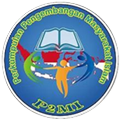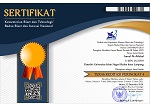ENDOGAMOUS MARRIAGE OF WEST LAMPUNG SAIBATIN COMMUNITY FROM THE PERSPECTIVE OF ISLAMIC LAW
Abstract
Endogamous marriage is a union between tribes, ethnicities, and families in the same environment. Endogamous marriage in the family environment is a marriage between cousins and descendants who are the same or still have a family relationship between the two. Marriage or nayuh in the Saibatin community is carried out by people of the same tribe, one faith, and even some with close relatives. The meaning of close is marriage between third cousins and so on. With the development of the current era, the marriage system among clans or tribes has faded after a shift in social values. This study aims to analyze endogamous marriages in the Saibatin tribe according to the perspective of Islamic law. This research is field research with a descriptive-qualitative approach. The research subject comprises a married couple who have entered an endogamous marriage. The research location is in three villages from several sub-districts in West Lampung Regency. The results of the researcher's survey of respondents and correspondents show that endogamous marriages did not conflict with Islamic law. According to maqasid shari'ah, it is judged as permissible to be carried out as the law is daruriyat because it is to maintain religion, soul, mind, offspring, and property. According to urf, it is judged as shahih urf because it does not conflict with Islamic law and is based on taghayurul ahkam wal amkinah. Endogamous marriages are rare due to shifting social values in local customary law; as for the marriage law, it is mubah.
Keywords
Full Text:
PDFReferences
A. Darrusalam, Jurnal Perniakahan Endogami Perspektif Islam dan Sains, (Makasar: Universitas Ushuludin Filsafat dan Politik, 2017)
Abd al-Wahhab Khallaf, ‘Ilm Ushul alFiqh, (Mesir, Maktabah al-Da’wah al-Islamiyah, 1990).
Abubakar, Fatum. “Islamic Family Law Reform: Early Marriage and Criminalization (A Comparative Study of Legal Law in Indonesia and Pakistan).” Al-Ahkam Jurnal Ilmu Syari’ah Dan Hukum 4, no. 2 (2019).
Basyar, Syaripudin, Zulhannan Zulhannan, and Ahmad Muzakki. “Islamic Characters Education Construct Of Young Generation Based On Local Cultural Values Of Lampung Indigenous Peoples.” AKADEMIKA: Jurnal Pemikiran Islam 25, no. 1 (2020): 65–90.
Busyro, Memahami Al-syari’ah pengetahuan dasar mengenai maslahah, (Bandung: Kencana prenada, 2019).
Eko, Bertha Sri, and Hendar Putranto. “Face Negotiation Strategy Based on Local Wisdom and Intercultural Competence to Promote Inter-Ethnic Conflict Resolution: Case Study of Balinuraga, Lampung.” Journal of Intercultural Communication Research 50, no. 5 (2021): 506–40.
Ergashev, Ibodulla, and Nodira Farxodjonova. “Integration of National Culture in the Process of Globalization.” Journal of Critical Reviews 7, no. 2 (2020): 477.
Fatmawati, Endang. “Strategies to Grow a Proud Attitude towards Indonesian Cultural Diversity.” Linguistics and Culture Review 5, no. S1 (2021): 810–20.
H. Maksum, Perkawinan Endogami Dikalangan Masyarakat Amuntai Kota Palangkaraya, (Palangkaraya : IAIN Palangkaraya, 2021)
Hakimy, Idrus. Pokok-Pokok Pengetahuan Hukum Adat Minang Kabau. Bandung: PT.Remaja Rosda Karya, 2017.
Kesuma, Arsyad Sobby, Kiki Muhamad Hakiki, and Bukhori Abdul Shomad. “Negotiation Of Islam And Local Culture In Traditional Lampung Marriage.” Al-Adyan: Jurnal Studi Lintas Agama 17, no. 1 (2022): 201–19.
Nenni rachman, Jurnal Ar-risalah perkawinan endogami perspektif hukum adat dan hukum islam (Watampone: stain watampone, 2016)
Presiden Republik Indonesia, Undang-Undang No.1 Tahun 1974, (Jakarta: September, 2020 )
Raharjo. Sosiologi Pedesaan Dan Pertanian. Yogyakarta: Gajah Mada University, 2018.
Rifa’I Abu Bakar, Metodologi Penelitian, (Yogyakarta: Suka Press, 2021)
Salman, Otje. Rekonseptualisasi Hukum Adat Kontempor. Bandung: Pt. Alumni, 2019.
Shobron, Sudarno, and Muh Nur Rochim Maksum. “Humanist Education the Dayak of Kalimantan Indonesia Islamic Perspective.” Solo Universal Journal of Islamic Education and Multiculturalism 1, no. 01 (2023): 20–29.
Sinaga, Risma Margaretha. “The Kinship Commodification of Local Ethnic in Lampung in Multicultural Relations.” Folklor/Edebiyat 27, no. 108 (2021): 1163–73.
Stark, Alexander, and Fatan Hamamah Yahaya. “The Paternal Side of the Family within a Matrilineal Society: An Example of the Minangkabau in Indonesia.” IIUM Journal of Human Sciences 3, no. 2 (2021): 54–67.
Suhairi, Suhairi. “The Impact of the Sesan Customary Practice on the Traditional Marriage of the Lampung Pepadun Society in Instilling Sharia Social Values.” Journal of Social Studies Education Research 12, no. 3 (2021): 225–47.
Sulaiman Rasjid, Fiqih Islam, (Jakarta: Attahiriyah,, 1993)
Susanto, Henry, Yusuf Perdana, and Justika Indriyani. “Sakukha Traditions: Preserving the Tradition in the Society of West Lampung to Enhance Historical Mindness.” International Journal of Multicultural and Multireligious Understanding 8, no. 5 (2021): 446–57.
Teubner, Gunther. “Societal Constitutionalism: Alternatives to State-Centred Constitutional Theory?” In Luhmann and Law, 473–98. Routledge, 2022.
Zaelani, Abdul Qodir, Faisal Faisal, Mokhamad Samson Fajar, and Abdul Hanif. “An Implementation of the Joint Inheritance Division of Ethnic Groups in Lampung, Indonesia.” Samarah: Jurnal Hukum Keluarga Dan Hukum Islam 7, no. 3 (2023): 1373–96.
DOI: http://dx.doi.org/10.24042/ijpmi.v16i2.17361
Refbacks
- There are currently no refbacks.
Jurnal Ijtimaiyya is licensed under a Creative Commons Attribution-ShareAlike 4.0 International License.






1.png)
11.png)
.png)


